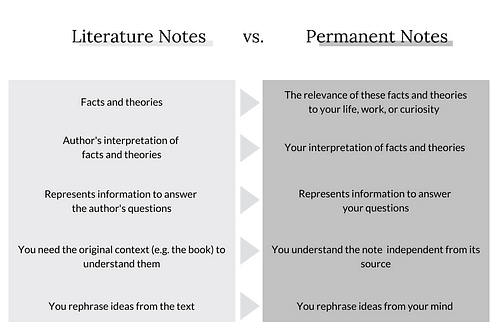Zettelkasten’s 3 Note-Taking Levels Help You Harvest Your Thoughts
Curated from: betterhumans.pub
Ideas, facts & insights covering these topics:
10 ideas
·484 reads
2
Explore the World's Best Ideas
Join today and uncover 100+ curated journeys from 50+ topics. Unlock access to our mobile app with extensive features.
Invented by Niklas Luhmann
Niklas Luhmann , a notable sociologist, was living proof for a system that is effective. During his life, he wrote 70 books and 500 scholarly articles. He attributes his success to a note-taking system called the Zettelkasten , which is the German word for slip box (Luhmann’s system was done on index cards or “slips,” stored in boxes, and later digitized).
18
120 reads
Level 1️⃣: Fleeting Notes
Fleeting notes are ideas that pop into your mind as you go through your day. They can be really short, just like one word. You don’t need to organize them. They just serve as reminders of your thinking.
These notes have no value except as stepping stones for turning literature notes into permanent notes. You discard the fleeting notes once you transformed them into permanent notes (more on that in level 3).
23
57 reads
Level 2️⃣: Literature notes
You capture literature notes from the content you consume. It’s your bullet-point summary from other people’s ideas. I create these notes for all books, podcasts, articles, or videos I find valuable.
22
72 reads
What makes good literature notes
You can be extremely selective, or simply takes notes upon asking yourself:
- What is interesting about this?
- What’s so relevant it’s worth noting down?
By transforming consumed content into literature notes, you're using one of the most effective learning strategies. When you elaborate, you rephrase new information in your own words and connect it to existing knowledge. You’ll make it more likely to remember what you read.
19
44 reads
Use context to create a notes network
A note is only as useful as the context you place it in. A note’s true value unfolds in its network of connections and relationships to others.
You don’t have to use your brain anymore to find separate ideas from different books related to each other. In a Zettelkasten, you don’t file notes in the context you found them but in the context in which you want to discover them.
21
30 reads
Good cross-references increases your notes' value
“Making good cross-references is a matter of serious thinking and a crucial part of the development of thoughts.”
Here are two questions to ask yourself when you create references for your literature notes. Answering them will help you make good cross-references:
- In which circumstance do I want to find this note?
- When and how will I use this idea?
18
31 reads
Level 3️⃣: Permanent notes
Permanent notes are the real value-adders. You create them by looking through your fleeting and literature notes. Ideally, you create them once a day.
Both Sönke Ahren and Andy Matuschak say a knowledge worker’s productivity should be measured by the number of permanent notes they write in a day.
“If you had to set one metric to use as a leading indicator for yourself as a knowledge worker, the best I know might be the number of Evergreen notes written per day.”
23
31 reads
How to create permanent notes
As a rule of thumb, you can create permanent notes about every topic you're curious about or working on. When you’re in doubt, ask yourself whether you’re curious to explore your idea further.
When you create permanent notes, you think for yourself. In contrast to literature notes, you don’t summarize somebody else's thoughts.
While your literature notes are bullets, your permanent notes are written prose. A reader of your permanent note should understand it without reading its source.
19
28 reads
Literature notes vs. Permanent notes
Sometimes permanent notes are truly original. Other times they can be just a reference to the original source added with a personal anecdote.
Permanent notes are no holy grail — but a work in progress. Don’t be afraid to write them. You can change and update them whenever you want: what permanent really means is that they’re permanently useful to you.
20
44 reads
A Zettelkasten can work as an idea-generation machine
Creating a personal knowledge database can feel difficult. First, the many options and tutorials confuse you. Then, building a system slows down your consumption speed.
A Zettelkasten can work as an idea-generation machine. You discover related ideas that you hadn’t thought of in the first place. As your notes grow, you likely start seeing puzzle pieces for the bigger picture. This picture can serve as the basis of your original work.
19
27 reads
IDEAS CURATED BY
36 yr old product guy. Interested in meditation, product design and the future.
Alexandru Băduț's ideas are part of this journey:
Learn more about writing with this collection
How to make good decisions
How to manage work stress
How to manage email effectively
Related collections
Similar ideas
6 ideas
From note-taking to note-making
nesslabs.com
4 ideas
From note-taking to note-making
nesslabs.com
9 ideas
Zettelkasten Method as a Way to Manage Your Notes
productive.fish
Read & Learn
20x Faster
without
deepstash
with
deepstash
with
deepstash
Personalized microlearning
—
100+ Learning Journeys
—
Access to 200,000+ ideas
—
Access to the mobile app
—
Unlimited idea saving
—
—
Unlimited history
—
—
Unlimited listening to ideas
—
—
Downloading & offline access
—
—
Supercharge your mind with one idea per day
Enter your email and spend 1 minute every day to learn something new.
I agree to receive email updates

